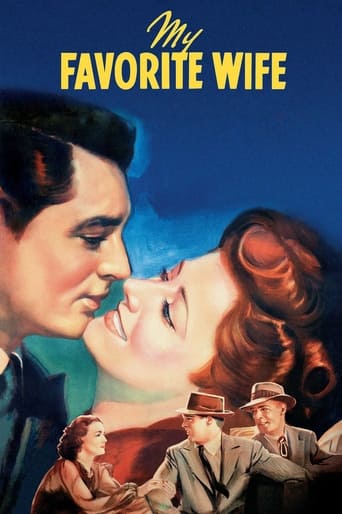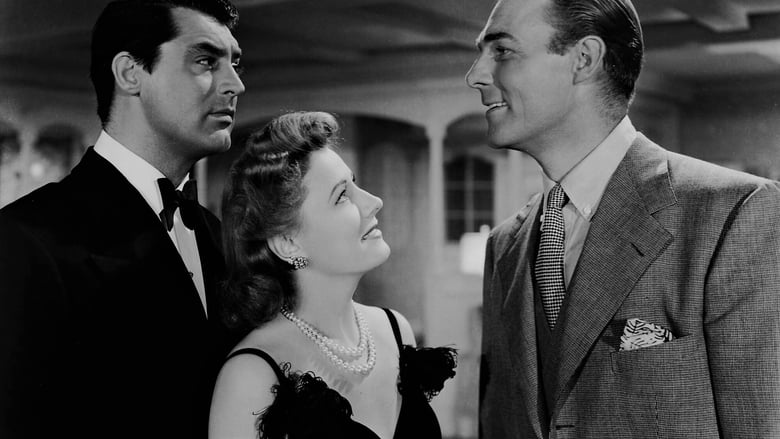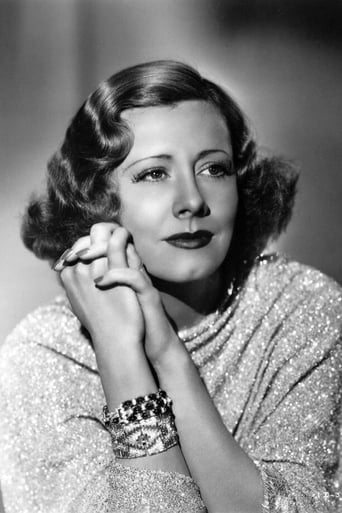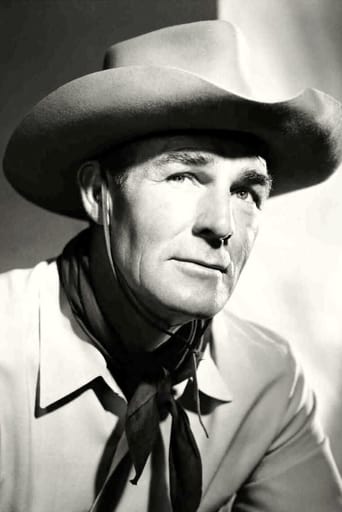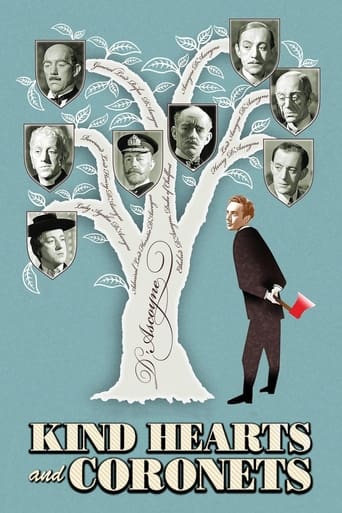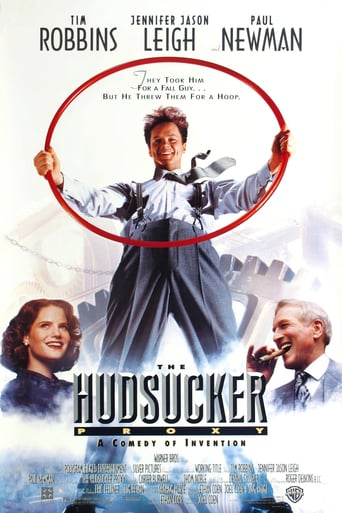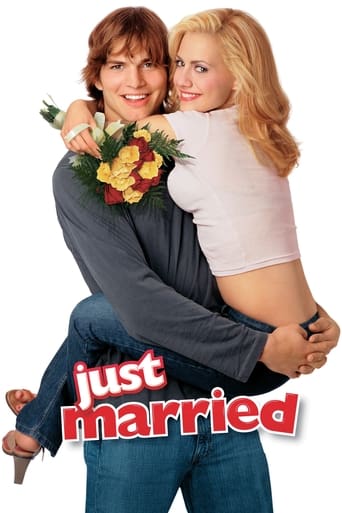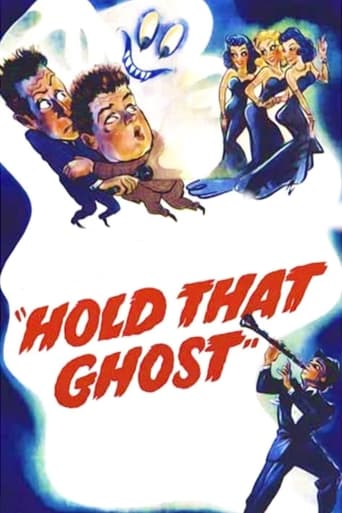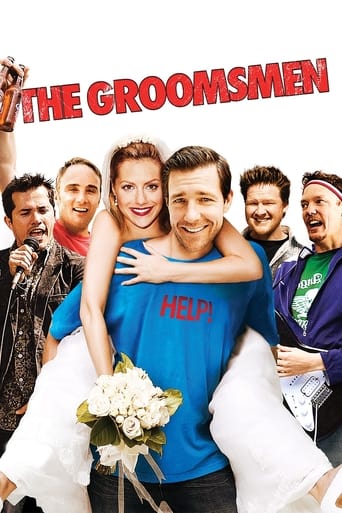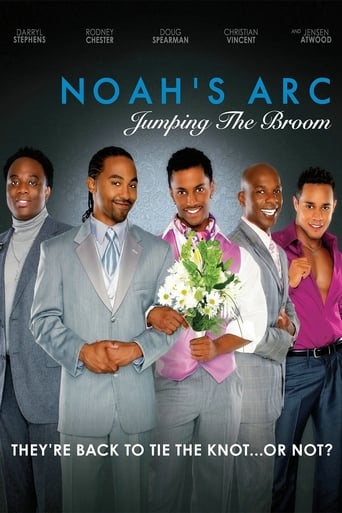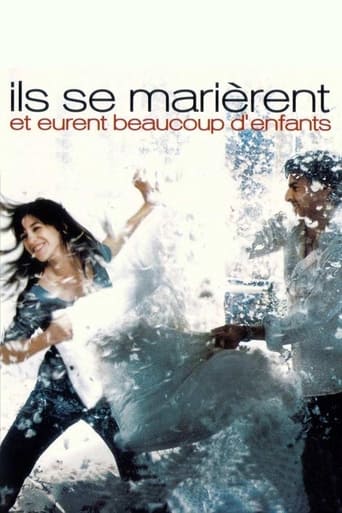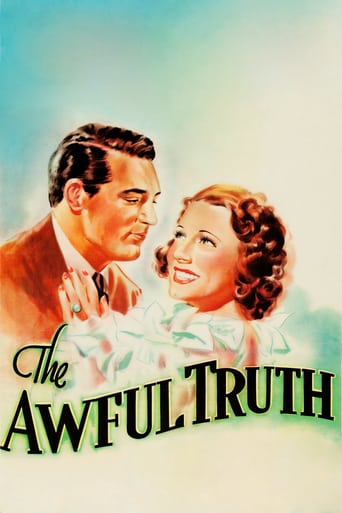My Favorite Wife (1940)

Seven years after a shipwreck in which she was presumed dead, Ellen Arden arrives home to find that her husband Nick has just remarried. The overjoyed Nick struggles to break the news to his new bride. But he gets a shock when he hears the whole story: Ellen spent those seven years alone on a desert island with another man.
Watch Trailer
Cast


Similar titles
Reviews
"My Favorite Wife" (1940) is an extremely difficult film for a professional critic to evaluate, as he or she knows just what a complicated and lengthy process movie-making entails. Randolph Scott does not appear in this movie by accident, or because he simply happened to be free. His relationship was so well-known that John Farrow cleverly points it out in a short subject about horse racing that he directed in the mid-1930s. Frankly, I don't like Grant, the man, either, but I particularly dislike Scott, who used to be my hero – but there's nothing worse than a feeling that you've been betrayed, and even worse, made a sucker of! You could argue that it is quite wrong to judge actors against the standards you would apply to anyone else. You have to make an exception for actors is the general rule. Why? Why should actors be excepted? The answer to this question generally is "because they are special." And why are people like Grant and Scott special? Because the army won't have anything to do with them either! Okay, let's put all that feeling of uneasiness aside and just judge the movie by what we see on the screen, and not by what happens after the director says, "Cut!" In this respect – just judging the movie by what we see on the screen – we are asked to believe that a reasonably young, extremely vigorous man and a healthy, sexy, very attractive woman lived together on a small, otherwise deserted tropical island for over seven years and never once had intercourse! Come on, fellas! That is surely the most ridiculous scenario I've ever heard in my life! It says much for the movie makers' skills that, despite all its drawbacks, the movie is still quite entertaining. This is partly due to the fine support cast, particularly Granville Bates (the aseptic judge), and Donald MacBride (the browbeaten hotel clerk).
The romantic comedy "My Favorite Wife" is a consistently entertaining sex romp that carefully skirts vulgar material. Cary Grant bounces back and forth between two women. One of them used to be his wife while the other is his new wife. "Adam's Rib" director Garson Kanin and scenarists Bella & Sam Spewack with Leo McCarey had to tread carefully on their subject matter because the Production Code Administration condemned any movie that didn't treat marriage with respect. The amusing premise is that our protagonist, Nicholas Arden (Cary Grant), has just had his first wife declared legally dead in court. Arden's first wife, Ellen Wagstaff Arden (Irene Dunne) vanished somewhere in Indochina when her ship sank. She had just given birth to two children, a boy and a girl, and had gone off on an anthropological expedition when her ship went down. Nicholas traveled to Bangkok to interview everybody who had anything to do with the shipwreck, but he wasn't able to find his wife. Seven years have elapsed, and Nicholas is planning to remarry to Bianca (Gail Patrick) after the court declares that Ellen is legally dead. Unbeknownst to Nicholas, Ellen survived the shipwreck and spent those seven years on an island. No sooner has Nicholas married Bianca than Ellen comes home. It seems that a Portuguese freighter wandered off course by 200 miles and found Ellen. When she arrives at her old home, she finds the two children that she had only known as infants when she left them. Little Timmy and Chinch tell their mother that their mother drown at sea. When she tries to get more details out of them, they inform her that they aren't allowed to speak to strangers. Ellen slips into the house and surprises her mother. Ellen's mom explains that Nicholas and Bianca have left to celebrate their honeymoon. Morever, they are celebrating it at the same hotel that Nicholas and Ellen celebrated their honeymoon. Ellen hops on a plane and arrives ahead of them at the hotel. When Nicholas and Bianca show up, Nicholas refuses to take Suite A because Ellen and he spent the night there on their honeymoon. They have just gotten aboard the elevator when Nicholas spots Ellen in the lobby. At this point, our hero is not allowed to consummate his marriage to Bianca. Naturally, he is shocked by Ellen's appearance and she explains that she survived and has come home. She realizes the predicament that Nicholas is in and prompts him to tell Bianca about her. Poor Nicholas is caught between a rock and a hard place. Although he is an attorney, Nicholas finds himself tongue-tied by his situation. Clearly, since Ellen is not really dead, Nicholas cannot climb into bed with his second wife. Meanwhile, Bianca is considerably upset because Nicholas keeps running out on her. Adding to their woes is a suspicious hotel clerk (Donald McBride) who watches as Nicholas picks out Suite A for them. Immediately, the clerk suspects that Nicholas is determined to destroy the sterling reputation for honesty and decency that the hotel has maintained for 33 years. After the first forty minutes, "My Favorite Wife" takes a dramatic turn when Nicholas discovers that Ellen spent those seven years on that island with another man, Stephen Burkett (Randolph Scott), who happens to be a physical specimen of muscular perfection. Indeed, one of the women at pool side at the hotel where Burkett is staying asks Nicholas if Stephen is Tarzan actor Johnny Weissmuller.
I played this to myself on a long flight back from a winter sun holiday and the near 90 minutes it took up simply (pardon the pun) flew by. I love the screwball comedy "genre" and will be endeavouring this Christmas holiday to seek out as many examples as I can, but I doubt many of them will beat this Leo McCarey production directed by young hot-shot (at the time) Garson Kanin.The premise is as daffy as you would expect but boy do Cary Grant (at his effortless best) and one of his most supreme comic foils Irene Dunne run with it.I laughed out loud many times in the first thirty minutes and anxiously looked at my watch wondering where the story and laughs were going to come for the next 60 minutes but it just kicked on with Dunne's hilarious attempt to hoodwink Grant as to the hunkiness (or lack of same) of her seven year companion on their desert island and the easy introduction of Randolph Scott as the All-American athlete she actually hunkered down with.The timing of all concerned, particularly the leads of course, is near perfect throughout, the comedic situations hilarious (bookended by a courtroom scene with a great turn by Granville Bates as an incredulous judge - an idea so good that Peter Bogdanovich lifted it almost wholesale for his 1972 homage "What's Up Doc") and climaxing in a homage of its own to the one that started it all, the famous "Walls Of Jericho" scene in Gable & Goddard's "It Happened One Night" and of course its own Grant / Dunne predecessor "The Awful Truth".I keep coming back to Grant and Dunne as the keystones to the film's success. Both separately (Grant in his interplay with the hotel manager during extended avoidance of new, wholly undeserving bride Gail Patrick, perhaps the only actor in the film who fails to catch the arch mood of the piece) and Dunne (when she affects accents of contemporaries Hepburn and Davis to devastating comic effect) but especially together - these two play off each other to the manner born.Even the scenes with their kids don't grate, there's admirably little recourse to the use of traditional slapstick and the way this sex-farce pushes the envelope out at the censor (especially Grant's preening himself with women's clothing and that ending when you know he's about to become literally "Bad Santa") just takes the biscuit.A sheer delight, from start to finish.
"My Favorite Wife," uses the formula, the stars and the director of the hugely successful "The Awful Truth," and tries to do it all over again. Unfortunately, this time, it falls flat, feeling like exactly what it is, a rehash of a much, much better film. Instead of trying to do something different, we get the same story, slightly changed but with the same gags and plot devices. In both, there is a married couple dealing with a separation. In both, the wife tries to hoodwink a female paramour by adopting a weird accent. In both, the wife tries to convince the husband that nothing happened with a male admirer. In "The Awful Truth," the first half of the film was concerned with the husband's jealousy over another man; the second half with the wife trying to get rid of the inconvenient other woman. In "My Favorite Wife," this plot structure is simply reversed, the other woman comes in the first half, the husband's jealousy in the second. This is about as original as "My Favorite Wife" gets. Children are also added this time around, unnecessarily, serving to make everything feel more domestic and boring. The film ends appropriately, in a sad attempt to recapture the magic at the end of "The Awful Truth." It stages the scene in practically the same way. While "The Awful Truth" ended with a dignified Grant and Dunne finally getting together, "My Favorite Wife" ends with Grant in a Santa Claus suit, a fitting contrast between the two films.Randolph Scott is wasted here, his role amounting to more of a cameo, less a full-fledged character. The reason he's in the movie at all is probably to make light of the rumors concerning his real-life relationship with Cary Grant (they lived together for a number of years). The film has Grant almost swoon at the sight of a shirtless Scott taking a dive, and later it has Grant sitting in his office, reliving the moment in his mind. And then there's the scene of Grant looking through women's clothing, holding them up to a mirror, while telling a doctor, "I have to go, he's waiting for me in the car!" Fun at the expense of Cary Grant's sexuality is probably the most interesting thing about the picture.Overall, this movie is lifeless, a bankrupt attempt to recreate the success of "The Awful Truth." It repeats too many elements, and not very successfully. Watch "The Awful Truth" instead.

